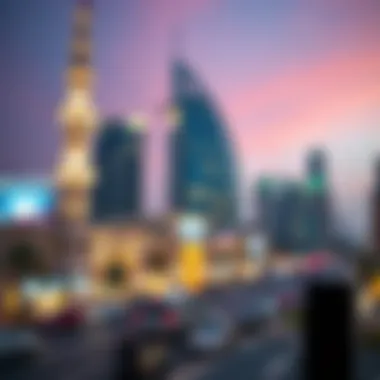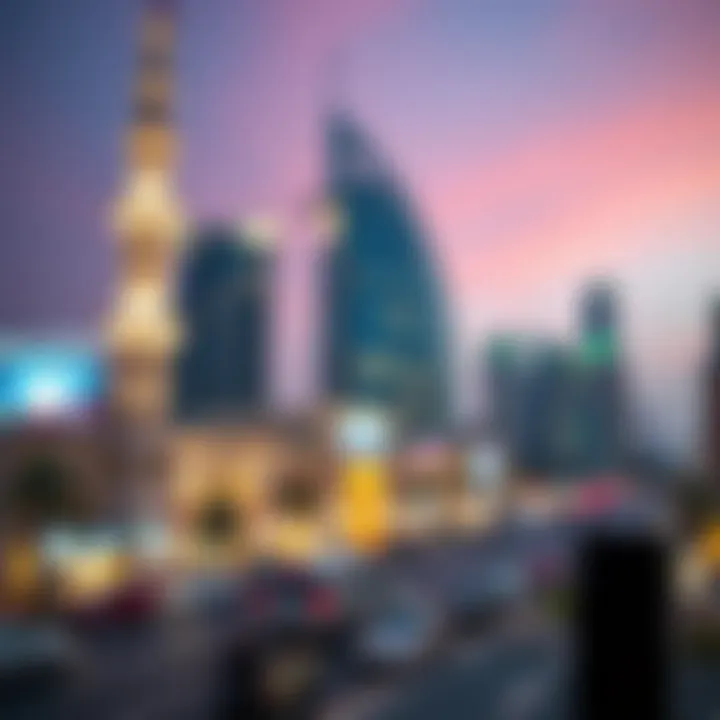Exploring Public Holidays in Dubai: Insights and Impact


Intro
Public holidays in Dubai serve not just as leisure days; they are windows into the rich tapestry of cultural celebrations and religious observances that epitomize the spirit of this vibrant city. These holidays imbue daily life with rhythm and meaning, impacting everything from individual lifestyles to overarching business operations. Whether you’re an expatriate navigating the local customs or an investor keen on understanding the wider implications for the real estate market, grasping the significance of these days is crucial.
Dubai's public holidays reflect the diverse cultural heritage and religious foundations of the emirate, creating a unique landscape of celebrations that resonate with both residents and visitors. Throughout the year, various public holidays not only provide the opportunity for community gatherings but also influence economic activities, making it essential to understand their implications. As we delve into this intricate subject, we will explore the historical context, cultural relevance, and practical impacts on day-to-day life and business in Dubai.
In the following sections, we will focus on key trends in the real estate landscape prior to public holidays, uncover investment opportunities, and evaluate how these days enhance community engagement and luxury living. Let's begin by assessing the market insights that characterize public holidays in Dubai.
Prelude to Public Holidays in Dubai
Public holidays in Dubai play a pivotal role in shaping the cultural landscape of the city and influencing the daily lives of its residents. These occasions are not merely days off from work; they echo the rich tapestry of tradition and religion that guides the Emirati community. Recognizing the implications of these holidays is essential for anyone looking to navigate life or business in Dubai effectively.
The unique blend of cultures due to the expatriate population adds another layer of complexity and vibrancy to these holidays. By understanding their significance, investors and expatriates can better align their activities with cultural sensitivities and community practices, fostering better relationships and opportunities.
Overview of Public Holidays
Dubai's public holidays are a mix of religious observances and national celebrations that reflect the values of the society. For instance, holidays like Eid al-Fitr and Eid al-Adha stem from Islamic traditions, while National Day celebrates the unification of the emirates. These dates may vary slightly from year to year, as they often depend on lunar calendars and official announcements, making it essential to stay updated.
Moreover, the government periodically announces additional holidays or changes to existing ones, often influenced by current events or strategic interests. Here’s a snapshot of regular public holidays observed in the region:
- Islamic New Year
- Eid al-Fitr
- Eid al-Adha
- Commemoration Day
- National Day
Given this fluidity, it's paramount for businesses, especially in real estate and tourism, to anticipate and prepare for these fluctuations to maximize their engagement with local markets and clientele.
Cultural and Historical Significance
The cultural significance of Dubai’s public holidays cannot be overstated. Each holiday represents an opportunity for the community to reflect, rejoice, and reinforce family bonds. For instance, Eid al-Fitr marks the end of Ramadan, a month characterized by fasting and spiritual reflection. This holiday is centered around community feasting and charity, showcasing the social fabric that binds families and friends together.
On the other hand, National Day resonates deeply with the identity of the Emirati people. It commemorates the formation of the United Arab Emirates in 1971—a moment that not only signifies national pride but also fosters a sense of unity among the diverse population residing in Dubai.
Moreover, the holidays serve as platforms for promoting cultural heritage through various events and festivals. It’s common to see traditional performances, art exhibitions, and even workshops to educate the younger generations about their history and customs.
Celebrating public holidays in Dubai is not just observing a day off, but participating in a vibrant narrative that fleshes out the collective identity of its people.
In essence, grasping the cultural and historical significance of these holidays enriches the understanding of Dubai's society and its ongoing evolution. Investors and expatriates who align their activities and strategies with these cultural norms will find themselves better equipped to thrive in this dynamic environment even as they navigate the nuances of public holidays.
List of Major Public Holidays
In the bustling metropolis of Dubai, public holidays play a central role in shaping the social and cultural fabric of the city. These holidays are not just days off from work; they serve as significant milestones in the lives of residents and expatriates alike. Recognizing the major public holidays is essential for anyone looking to navigate life in Dubai, whether for personal or professional reasons. From family gatherings to festive celebrations, these holidays contribute to the rich tapestry that defines Emirati culture.
Islamic New Year
The Islamic New Year, known as Hijri New Year, marks the beginning of the lunar calendar and is observed throughout the Muslim world. In Dubai, this holiday is an invitation for reflection and renewal. For expatriates, understanding this holiday is vital, as many businesses adapt their operations to accommodate the changing schedules. During this period, you might notice a slower pace at local shops and restaurants, which may close earlier than usual.
This holiday’s significance goes beyond just being a time off; it encourages people to spend time with family and partake in spiritual activities. Residents often visit mosques and engage in community services, reinforcing the value of unity and belonging. Businesses that respect these cultural observances tend to foster better relationships with both clients and employees, which can be a significant advantage in a multi-cultural work environment.
Eid al-Fitr
Eid al-Fitr is one of the most celebrated occasions in Dubai, marking the end of Ramadan—a month of fasting and prayer. This holiday is a colorful explosion of joy, with families gathering for feasts and exchanging gifts. The streets are often festooned with lights and decorations, creating a festive atmosphere that envelops the entire city.
For investors and developers, this holiday presents unique opportunities. The influx of domestic and international tourism can increase demand in the hospitality sector. Hotels often run special promotions, enticing visitors to explore what Dubai offers. This time of celebration provides a backdrop for lucrative real estate investment opportunities as buyers look to secure properties in well-frequented areas.
Eid al-Adha


Eid al-Adha, or the 'Festival of Sacrifice,' is celebrated roughly 70 days after Eid al-Fitr and holds profound significance for Muslims. It commemorates Abraham's willingness to sacrifice his son in obedience to God. In Dubai, celebrations include prayers at mosques and communal feasts. The holiday often sees family members gathering to share meals of lamb and rice, strengthening bonds.
Interestingly, this holiday also influences the real estate market. Developers often find that property sales spike around holidays, as families consider upgrading to larger homes to accommodate gatherings. It’s a time when many expatriates contemplate their long-term living arrangements, making it essential for agents and investors to be aware of these seasonal patterns.
Commemoration Day
Commemoration Day, also referred to as Martyrs’ Day, is observed on November 30. The day is a solemn occasion, honoring the sacrifices made by Emirati soldiers in the line of duty. Patriotic sentiments run deep, with many citizens and residents gathering at monuments and memorials. This holiday underscores the importance of unity and respect for those who devote their lives to the country.
While it may not be a festive occasion filled with celebrations, its impact on the community is undeniable. Those contemplating business ventures in the area should note the increased sense of nationalism during this time, which can foster goodwill and enhance customer loyalty. Understanding local sentiments can be advantageous for businesses that seek to build a strong rapport with the community.
National Day
National Day, celebrated on December 2, marks the formation of the United Arab Emirates. Festivities abound, with parades, fireworks, and events that reflect national pride. The spirit of this day is infectious; both locals and expatriates partake in celebrations, showcasing a unique blend of cultures. It’s a carnival that draws families together, reflecting the unity and diversity that characterizes Dubai.
For those involved in real estate or tourism, National Day weekend is an opportune time to market properties and services to an eager population. Events attract large crowds, increasing foot traffic, and potential sales. Knowing how to leverage this holiday can make a significant difference for agents and developers aiming to tap into the celebratory mood of this day.
The Impact of Holidays on Living in Dubai
Public holidays in Dubai are not just days off from work; they profoundly influence the city’s lifestyle, economy, and overall atmosphere. Understanding the impact of these holidays provides valuable insights into how life unfolds in this vibrant metropolis. For expatriates, investors, and anyone contemplating living in Dubai, grasping the nuances of how holidays affect day-to-day life is crucial.
As a melting pot of cultures, Dubai observes various public holidays predominantly aligned with Islamic traditions. These occasions are steeped in religious significance, making them a focal point for community engagement and social gatherings. Understanding the rhythm of these holidays can greatly affect how one experiences living in Dubai.
Effects on Work and Business
Public holidays often lead to significant changes in work schedules and business operations. For many companies, especially those in sectors like tourism, hospitality, and retail, public holidays provide a chance to leverage increased foot traffic. However, they also necessitate a careful balancing act regarding employee scheduling and productivity.
In sectors like real estate or finance, businesses may see a slowdown during major holidays, such as Eid al-Fitr or Eid al-Adha. These periods can result in temporarily reduced activities, affecting project timelines and transaction processes. Companies often adjust work hours, with some opting for shorter days leading up to holidays to accommodate staff schedules.
- Flexible Scheduling: Many organizations implement flexible hours around holidays to ensure that operations run smoothly while allowing employees to participate in cultural celebrations.
- Productivity Shifts: Some firms report changes in productivity; employees may be less focused leading up to a holiday as they anticipate time off, which can affect overall business performance.
The net result is a unique work culture that might seem foreign to newcomers. Yet, it's important for expatriates and investors alike to embrace this rhythm as part of the larger Dubai experience.
Changes in Real Estate Activity
Dubai's real estate market experiences fluctuations tied to public holidays, with significant ramifications that investors and homebuyers should recognize. During periods like National Day or Islamic New Year, there is usually an uptick in real estate viewings and acquisitions, as people have leisure time to explore housing options.
However, the timing of these holidays also coincides with periodic adjustments in market expectations. Key aspects include:
- Increased Buyer Interest: Many potential buyers take advantage of extended weekends to explore properties, resulting in a brief spike in demand exchanges.
- Investment Opportunities: Savvy investors often time their purchases around these holidays, capitalizing on seasonal promotions or incentives offered by developers aiming to attract buyers during busy periods.
Regrettably, fluctuations in demand can lead to short-term volatility in property prices. A sudden rush to purchase can drive prices up temporarily, only for them to stabilize post-holiday as supply and demand realign.
In summary, while Dubai’s public holidays bring festive air to the city, they also require understanding and adaptation, particularly for those engaged in the business or real estate sectors. The rhythms of public holidays are a telling reflection of Dubai’s unique lifestyle and economic landscape.
Travel and Tourism During Holidays
When it comes to public holidays in Dubai, the ripple effect on travel and tourism cannot be underestimated. Whether for expatriates planning a getaway or visitors seeking an immersive experience, understanding these holiday schedules is crucial. The beauty of Dubai is magnified during public holidays, as the city swings into a festive mode. Each holiday brings a unique flavor to the streets, making it a vibrant tableau of cultures and celebrations. For investors and tourists alike, these holidays are more than just days off; they present an opportunity to tap into the local culture while enjoying world-renowned attractions.
Tourist Attractions and Events
Dubai, a city of wonders, showcases myriad attractions that become particularly appealing during public holidays. Some of the must-visit places where tourists flock include:
- Burj Khalifa – Not just a building, but an experience that offers breathtaking views of the cityscape. On holidays, special light shows often decorate its façade, captivating onlookers.
- Dubai Mall – This is a shopping paradise where visitors can enjoy various events, including live music, fashion shows, and even seasonal pop-ups. The mall's atmosphere buzzes with life during holidays, making it a central hub for both locals and tourists.
- Dubai Marina – A waterfront wonder, this area transforms into a lively scene with boat cruises and beach parties. Perfect for those looking to enjoy the sun and sea during long holiday weekends.


Additionally, numerous events are held throughout the year correlated with holidays, each providing a unique experience:
- Cultural Festivals – Many holidays are marked by cultural events that showcase the local heritage, such as art exhibits, food festivals, and traditional music performances.
- Fireworks Displays – Popular during significant holidays like New Year’s and National Day, these displays light up the skies and draw in crowds from all corners of the city.
Rounding out these attractions are seasonal events that can vary year by year, so staying updated is key.
Travel Tips for Visitors
Navigating Dubai during public holidays can be both exciting and challenging. Here are essential tips to enhance your experience:
- Plan Ahead: Book accommodations early, as hotels can fill up quickly during holiday seasons. Aim to reserve your spot weeks or even months in advance.
- Public Transport: Familiarize yourself with the metro and public bus routes. While road traffic may surge during holidays, the metro remains a reliable option to navigate the city.
- Check Timings: Many attractions may adjust their hours during public holidays. Always verify opening times and any special events that may require advance tickets.
- Respect Local Customs: While the city is modern, respecting local traditions is crucial. Dress modestly when visiting cultural sites, especially during festivals.
- Stay Flexible: With various activities, it’s easy to go with the flow. If something’s too crowded, have a backup plan. The beauty of Dubai is that there’s always something to see or do.
"Dubai during public holidays is like a vibrant tapestry of cultures, where each thread represents a unique experience waiting to be explored."
For more insights on traveling in Dubai, check out Visit Dubai or explore cultural events on Time Out Dubai.
Observations About Work Culture
Understanding the work culture in Dubai can be as critical as grasping its public holidays. The dynamics of work in Dubai often reflect a blend of tradition and modernity, influenced significantly by its multicultural environment. This section sheds light on how public holidays influence the work culture, employee rights, and overall business operations, which can help expatriates, investors, and stakeholders in making informed decisions in this vibrant urban landscape.
Work Hours Adjustments
Public holidays in Dubai lead to adjustments in work hours that can vary from one sector to another. Generally, during these holidays, the work week may be reduced or various companies may provide flexible arrangements. For instance, in the lead-up to Eid al-Fitr, many businesses close for an extended period, allowing their employees to fully engage in celebrations with family and friends. This not only fosters job satisfaction but also enhances employee motivation.
Such changes are not arbitrary but reflect deep respect for cultural observances. Companies often encourage employees to take time off, creating a balanced work-life environment. It’s worth noting that banks and government offices might have shorter hours than standard private sector businesses during significant holidays. However, it’s a common practice for private firms, especially in sectors like hospitality and retail, to maintain business continuity, albeit with adjusted staffing. This flexibility can help businesses retain talent while supporting a culturally rich lifestyle.
Employee Rights and Benefits
When we talk about employee rights during public holidays in Dubai, it’s paramount to understand that Islamic law plays a fundamental role. Under UAE labor law, employees are entitled to paid holidays, and those who work on public holidays shall receive additional compensation, often termed as overtime pay. This is not just a legal obligation but a practice that reinforces the bond between employers and employees.
Moreover, many businesses go the extra mile, providing additional leave days around major holidays. Features like these contribute significantly to work culture, transforming how employees perceive their workplaces. Companies that respect cultural values tend to attract and retain talent more effectively.
- In short, employees in Dubai typically enjoy:
- Paid holidays on designated public holidays.
- Compensation for overtime work on holidays.
- Optional leave days during festive seasons.
This kinder approach to work-life balance during holidays not only enhances employee loyalty but also positively impacts productivity.
Understanding how work culture adapts during public holidays is crucial for anyone navigating Dubai’s bustling economic landscape. This knowledge proves beneficial for expatriates and investors alike, helping them align their goals with what's customary within the region.
Public Holidays and Real Estate Trends
Understanding the intersection between public holidays and real estate trends in Dubai reveals unique opportunities and challenges that investors, homebuyers, and real estate professionals must navigate. Public holidays often serve not only as breaks from the regular hustle but also as focal points for various market activities. Analyzing this relationship provides valuable insights into when to make strategic moves in the bustling Dubai real estate market.
Market Fluctuations
When public holidays come around, they can lead to notable fluctuations in market activity. Often, you might see a dip in transactions right before the holiday season as potential buyers and sellers pause to focus on family and festivities. However, this doesn’t mean that all activity halts completely.
Instead, the atmosphere can be somewhat of a double-edged sword. Buyers who are eager to find a property often ramp up their efforts just before major holidays, hoping to finalize transactions before the festivities unfold. On the flip side, many sellers might leverage this time to attract attention for their listings, promoting special offers or conducting virtual tours to accommodate busy schedules.
Such shifts mean that real estate professionals should keep their fingers on the pulse of upcoming holidays. In Dubai, for instance, periods like Eid al-Fitr and National Day might see a spike in listings and viewings, creating windows of opportunity for savvy agents. It’s critical to be flexible and proactive during these times.
Investment Opportunities During Holidays


Public holidays in Dubai also open doors for unique investment opportunities that, if navigated deftly, can lead to substantial returns. Many investors identify these periods as prime times to invest in holiday-specific properties, like vacation rentals or serviced apartments that cater to both tourists and expatriates.
Given the strong cultural significance of holidays, properties situated close to major event venues or tourist attractions often see a surge in demand. Here are some considerations to keep in mind:
- Event Timing: Understanding local events and their cultural importance helps investors pinpoint when demand will peak.
- Promotional Strategies: Marketing properties during holidays with tailored promotional strategies can enhance visibility. Offers that cater to the holiday spirit often resonate well with potential tenants or buyers.
- Networking Opportunities: Holidays can serve as great networking cues. Engage in community events or celebrations to rub shoulders with potential clients and investors.
In summary, while public holidays may slow some aspects of the real estate market, they can also ignite specific opportunities. Making informed decisions based on the timing, nature of the holidays, and cultural context can significantly benefit those in the Dubai property landscape.
Key Insight: Staying attuned to public holidays and their impact on market trends isn't just about timing; it’s about leveraging cultural nuances to enhance your investment strategy.
For further insights, consider exploring resources such as Wikipedia on Dubai holidays or forums like Reddit where real estate professionals share their experiences.
International Comparisons
Understanding how public holidays are observed in different countries offers invaluable insights into cultural practices and societal norms. This analysis allows a comprehensive grasp of why Dubai’s public holidays play such a vital role not just locally but on a broader, global stage. Investors, homebuyers, agents, and expatriates should consider how these holidays shape interactions, business operations, and community life.
Public Holidays in Other Countries
Public holidays worldwide serve various functions, from celebrating independence to commemorating significant historical events. For instance, the United States celebrates Independence Day on the Fourth of July, characterized by fireworks and barbecues. Meanwhile, in Japan, people observe the Emperor's Birthday, a day marked by respect and national pride. In contrast, many countries like India observe multiple holidays representing diverse religions and cultures.
In Europe, public holidays often include both religious and secular observances, like Christmas in many Christian-influenced nations, while others may celebrate Labour Day as a nod to workers' rights. Here’s a brief overview of notable public holidays in various countries:
- United States: Independence Day, Thanksgiving, Memorial Day
- Japan: Showa Day, Shichi-Go-San, Golden Week
- India: Diwali, Eid, Republic Day
- Germany: Oktoberfest, Unity Day
This comparison demonstrates various methods of cultural celebration. Each holiday reflects unique societal values. By understanding these differences and similarities, expatriates in Dubai can better appreciate local traditions.
Cultural Differences and Similarities
Cultural observations around public holidays provide an opportunity to explore how societies honor their histories and foster community connections. While the core essence of public holidays—celebration, reflection, and respite—remains consistent across borders, the expressions differ widely.
For instance, Dubai's public holidays, influenced primarily by Islamic traditions, focus on faith and community. In contrast, Western nations might lean towards more secular celebrations or mix religious practices with national pride. This can lead to varying customs, food, and social gatherings.
- Common Threads: Celebrating family and community, honoring historical events
- Differences: Religious significance (high in Dubai), secular celebrations (more common in Western nations)
Dubai's holidays like Eid al-Fitr and Eid al-Adha encapsulate the importance of family and community, aligning closely with cultural values found in several Islamic countries. Thus, these holidays offer a lens through which to understand how traditions shape everyday life and business dynamics.
In summary, understanding public holiday comparisons sheds light on cultural distinctions and unity among nations. It nurtures respect for global traditions, facilitating smoother interactions for expatriates and investors navigating Dubai’s diverse landscape.
"Cultural understanding opens doors to more meaningful connections and productive partnerships across borders."
Further reading can be found at Wikipedia, Britannica, and other reputable sources.
End
In wrapping up the discourse on public holidays in Dubai, it's crucial to underline how these special days provide a window into the cultural tapestry of the city. Holidays are more than mere days off; they embody the essence of societal values, traditions, and religious observances that have shaped the landscape of this vibrant city. As residents and visitors navigate life in Dubai, understanding the intricacies of these holidays is imperative.
Summary of Key Insights
To recap, public holidays in Dubai serve several pivotal roles:
- Cultural Reflection: These holidays are deeply rooted in Islamic traditions, reflecting the local populace's beliefs and values.
- Economic Impact: Understanding holiday schedules can give investors an edge, especially in real estate, where market activity often fluctuates.
- Social Dynamics: For expatriates, grasping the significance of these days fosters a deeper connection with local cultures and communities.
- Business Considerations: Knowing when businesses may shut down or operate on reduced schedules helps in planning transactions and investments.
"Public holidays are not just breaks; they are periods of reflection, unity, and cultural festivities that encapsulate the spirit of Dubai."
Future Considerations
As Dubai continues to expand its horizons, the landscape of public holidays may evolve. Here are a few considerations that could shape the future:
- Potential New Holidays: With demographic shifts, the recognition of different cultural festivals might emerge, appealing more to expatriate communities.
- Business Adaptations: Companies might future-proof their operations to accommodate diverse workforces and their holiday observances.
- Urban Development: The influence of such holidays could lead to more integrated community spaces, allowing for collective celebrations.
- Tourism Trends: Increased international tourism during holidays may prompt the city to enhance its attractions around these times, providing unique experience for visitors.
Understanding public holidays not only enriches personal experiences in Dubai but also aids in strategic planning for those engaged in the real estate market. The delicate balance of tradition and modernity in these observances reflects the heart of what makes Dubai a unique and thriving destination.



